Editorial, J Regen Med Vol: 1 Issue: 1
Stem Cells and Regenerative Medicine
| Ian McNiece* | |
| Department of Stem Cell Transplantation and Cellular Therapy, MD Anderson Cancer Center, USA | |
| Corresponding author : Ian McNiece Department of Stem Cell Transplantation and Cellular Therapy, MD Anderson Cancer Center, Houston, Tx, USA, E-mail: imcniece@med.miami.edu |
|
| Received: June 28, 2012 Accepted: June 29, 2012 Published: June 30, 2012 | |
| Citation: McNiece I (2012) Stem Cells and Regenerative Medicine. J Regen Med 1:1 doi:10.4172/2325-9620.1000e102 |
Abstract
Stem Cells and Regenerative Medicine
Regenerative medicine has been proposed to provide in the near future cures for debilitating diseases such as diabetes, cardiovascular disease, and Alzheimer’s disease. In particular, the use of stem cells to repair damaged tissues has led to a number of clinical trials in a range of diseases. However, despite the enormous potential of stem cells for regenerative medicine, there are many hurdles to overcome to develop these therapies. Although we are able to isolate, culture expand and differentiate stem cells in vitro, the requirements for in vivo survival, proliferation and differentiation into functional tissue, are essentially unknown. In addition, we must understand the role of immune cells that may reject donor cells or trigger other immune reactions leading to failure of the therapy or even worse, death of the patient. Added to these biological issues are the regulatory requirements for conducting clinical trials and the complexities of cellular products. Many aspects of drug development including toxicology, development of potency assessment, determination of dosing and safety assessment in animal models are not readily applicable to cellular products.
| Regenerative medicine has been proposed to provide in the near future cures for debilitating diseases such as diabetes, cardiovascular disease, and Alzheimer��?s disease [1]. In particular, the use of stem cells to repair damaged tissues has led to a number of clinical trials in a range of diseases [2]. However, despite the enormous potential of stem cells for regenerative medicine, there are many hurdles to overcome to develop these therapies. Although we are able to isolate, culture expand and differentiate stem cells in vitro, the requirements for in vivo survival, proliferation and differentiation into functional tissue, are essentially unknown. In addition, we must understand the role of immune cells that may reject donor cells or trigger other immune reactions leading to failure of the therapy or even worse, death of the patient. Added to these biological issues are the regulatory requirements for conducting clinical trials and the complexities of cellular products. Many aspects of drug development including toxicology, development of potency assessment, determination of dosing and safety assessment in animal models are not readily applicable to cellular products. For example, testing in animal models is complicated due to the human origin of the clinical cellular products and xeno rejection in animals. In many cases the animal equivalent is biologically different and cannot be used in place of the human cellular product. Scientists have developed mouse models of immune compromised mice that enable engraftment of the human cells. However these models obviously do not evaluate the immune aspects of the cellular therapy. So how can Regenerative Medicine be developed? | |
| As detailed in the perspective article by Daley [2], there are many clinical trials in progress around the world evaluating cellular approaches to disease. Many of these studies involve testing mesenchymal stem cells (MSCs) in a range of clinical indications. The early results from these trials, along with extensive animal data, suggest limited integration of the infused cells into the target tissue and concluding that the benefits observed may be due to production of cytokines or other soluble mediators. Further it appears that benefits obtained from these treatments may be transient due to the lack of engraftment of the MSCs. As many of the treatments are invasive procedures, such as catheter delivery of cells to the heart [3], it is unlikely that multiple treatments will be feasible. A major challenge will be to continue with clinical trials when the initial studies show limited efficacy. Given the history of cellular therapies in bone marrow transplantation and immunotherapy [4,5] it is only through carefully designed incremental studies that these approaches will be optimized. Will NIH and other funding bodies continue to support clinical trials when the results show minimal efficacy? Some cellular products will be developed through commercial entities and the same questions will become critical to the long term survival of the companies with stock holders and the stock market expecting breakthrough results in clinical trials. | |
| Another consideration relates to the multicellular composition of tissues and organs. Ischemic events will damage all the cells of the tissue or organ and so multi cellular products will most likely be needed to restore full capacity. This may require sequential treatments with an initial cellular product, such as MSCs, to repair the tissue microenvironment, followed by a second cellular product to replace the functional mature cells of the tissue. In the absence of repair to the microenvironment, infusion of functional cells may result in poor engraftment of survival. | |
| In summary, although cellular therapy approaches to regenerative medicine offer great potential for resolving debilitating diseases, we need to increase our basic understanding of the biology of tissue structure and the cellular make up of tissues and organs. Carefully designed clinical trials will be needed to move forward in what will most likely be a step wise learning curve. These clinical trials will need to be performed in a safe manner and adhere to the regulatory framework of the FDA. | |
References |
|
|
